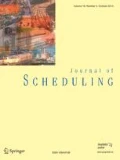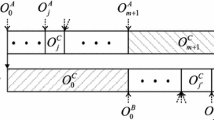Abstract
In this paper, we focus on the design of an exact exponential time algorithm with a proved worst-case running time for 3-machine flowshop scheduling problems considering worst-case scenarios. For the minimization of the makespan criterion, a Dynamic Programming algorithm running in \({\mathcal {O}}^*(3^n)\) is proposed, which improves the current best-known time complexity \(2^{{\mathcal {O}}(n)}\times \Vert I\Vert ^{{\mathcal {O}}(1)}\) in the literature. The idea is based on a dominance condition and the consideration of the Pareto Front in the criteria space. The algorithm can be easily generalized to other problems that have similar structures. The generalization on two problems, namely the \(F3\Vert f_\mathrm{max}\) and \(F3\Vert \sum f_i\) problems, is discussed.






Similar content being viewed by others
Notes
Instead of defining Critical Path in the context of digraph, here we adapt the definition to make it more intuitive.
References
Akiba, T., & Iwata, Y. (2015). Branch-and-reduce exponential/fpt algorithms in practice: A case study of vertex cover. Theoretical Computer Science. doi:10.1016/j.tcs.2015.09.023. http://www.sciencedirect.com/science/article/pii/S030439751500852X.
Ashour, S. (1970). A branch-and-bound algorithm for the flow shop problem scheduling problem. AIIE Transactions, 2, 172–176.
Brown, A., & Lomnicki, Z. (1966). Some applications of the “branch-and-bound” algorithm to the machine scheduling problem. Journal of the Operational Research Society, 17(2), 173–186.
Brucker, P. (2007). Scheduling algorithms (5th ed.). Berlin: Springer.
Carlier, J., & Rebaï, I. (1996). Two branch and bound algorithms for the permutation flow shop problem. European Journal of Operational Research, 90(2), 238–251.
Cheng, J., Kise, H., & Matsumoto, H. (1997). A branch-and-bound algorithm with fuzzy inference for a permutation flowshop scheduling problem. European Journal of Operational Research, 96(3), 578–590.
Cygan, M., Pilipczuk, M., Pilipczuk, M., & Wojtaszczyk, J. O. (2014). Scheduling partially ordered jobs faster than \(2^n\). Algorithmica, 68(3), 692–714.
Fomin, F. V., & Kratsch, D. (2010). Exact exponential algorithms. Springer Berlin Heidelberg.
Framinan, J. M., Gupta, J. N., & Leisten, R. (2004). A review and classification of heuristics for permutation flow-shop scheduling with makespan objective. Journal of the Operational Research Society, 55(12), 1243–1255.
Garey, M. R., Johnson, D. S., & Sethi, R. (1976). The complexity of flowshop and jobshop scheduling. Mathematics of Operations Research, 1(2), 117–129.
Gromicho, J. A., van Hoorn, J. J., da Gama, F. S., & Timmer, G. T. (2012). Solving the job-shop scheduling problem optimally by dynamic programming. Computers & Operations Research, 39(12), 2968–2977.
Ignall, E., & Schrage, L. (1965). Application of the branch and bound technique to some flow-shop scheduling problems. Operations Research, 13(3), 400–412.
Jansen, K., Land, F., & Land, K. (2013). Bounding the running time of algorithms for scheduling and packing problems. In F. Dehne, R. Solis-Oba, & J. R. Sack (Eds.), Algorithms and data structures (Vol. 8037, pp. 439–450)., Lecture notes in computer science Berlin: Springer.
Johnson, S. M. (1954). Optimal two-and three-stage production schedules with setup times included. Naval Research Logistics Quarterly, 1(1), 61–68.
Kelley Jr, J. E., & Walker, M. R. (1959). Critical-path planning and scheduling. In Papers Presented at the December 1–3, 1959, Eastern Joint IRE-AIEE-ACM Computer Conference (pp. 160–173), ACM.
Kung, H. T., Luccio, F., & Preparata, F. P. (1975). On finding the maxima of a set of vectors. Journal of the ACM (JACM), 22(4), 469–476.
Ladhari, T., & Haouari, M. (2005). A computational study of the permutation flow shop problem based on a tight lower bound. Computers & Operations Research, 32(7), 1831–1847.
Lageweg, B., Lenstra, J., & Rinnooy Kan, A. (1978). A general bounding scheme for the permutation flow-shop problem. Operations Research, 26(1), 53–67.
Lenté, C., Liedloff, M., Soukhal, A., & T’Kindt, V. (2013). On an extension of the Sort & Search method with application to scheduling theory. Theoretical Computer Science, 511, 13–22.
Lenté, C., Liedloff, M., Soukhal, A., & T’Kindt, V. (2014). Exponential algorithms for scheduling problems. https://hal.archives-ouvertes.fr/hal-00944382.
Lomnicki, Z. (1965). A “branch-and-bound” algorithm for the exact solution of the three-machine scheduling problem. Journal of the Operational Research Society, 16(1), 89–100.
McMahon, G., & Burton, P. (1967). Flow-shop scheduling with the branch-and-bound method. Operations Research, 15(3), 473–481.
Potts, C. (1980). An adaptive branching rule for the permutation flow-shop problem. European Journal of Operational Research, 5(1), 19–25.
Reza Hejazi, S., & Saghafian, S. (2005). Flowshop-scheduling problems with makespan criterion: A review. International Journal of Production Research, 43(14), 2895–2929.
Ruiz, R., & Maroto, C. (2005). A comprehensive review and evaluation of permutation flowshop heuristics. European Journal of Operational Research, 165(2), 479–494. Project Management and Scheduling.
Smutnicki, C. (1998). Some results of the worst-case analysis for flow shop scheduling. European Journal of Operational Research, 109(1), 66–87.
Sviridenko, M. (2004). A note on permutation flow shop problem. Annals of Operations Research, 129(1), 247–252.
Woeginger, G. J. (2003). Exact algorithms for NP-hard problems: A survey. In M. Jünger, G. Reinelt, & G. Rinaldi (Eds.), Combinatorial optimization—Eureka, you shrink! (Vol. 2570, pp. 185–207)., Lecture notes in computer science Berlin: Springer.
Xiao, M., & Nagamochi, H. (2013). Exact algorithms for maximum independent set. In L. Cai, S. W. Cheng, & T. W. Lam (Eds.), Algorithms and computation (Vol. 8283, pp. 328–338)., Lecture notes in computer science Berlin: Springer.
Author information
Authors and Affiliations
Corresponding author
Rights and permissions
About this article
Cite this article
Shang, L., Lenté, C., Liedloff, M. et al. Exact exponential algorithms for 3-machine flowshop scheduling problems. J Sched 21, 227–233 (2018). https://doi.org/10.1007/s10951-017-0524-2
Published:
Issue Date:
DOI: https://doi.org/10.1007/s10951-017-0524-2



